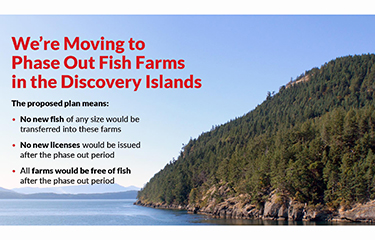Fisheries and Oceans Canada announced on 17 December it plans to phase out all existing salmon farming facilities in the Discovery Islands – located in British Columbia – with the upcoming 18-month period being the last time the area can be licensed.
The news comes in the wake of Canadian Prime Minister Justin Trudeau writing a letter in 2019 to Minister of Fisheries, Oceans, and the Canadian Coast Guard Bernadette Jordan mandating that she “work with the province of British Columbia and Indigenous communities to create a responsible plan to transition from open net-pen salmon farming in coastal British Columbia waters by 2025 and begin work to introduce Canada’s first-ever Aquaculture Act.” The mandate was a reflection of the Canada Liberal Party’s platform, which called for a shift of all net-pen fish farming in British Columbia to land-based, closed-containment systems by 2025.
According to the announcement by Fisheries and Oceans Canada, Jordan did as asked and worked with local indigenous communities to plan the phase-out of net-pen aquaculture in the Discovery Islands.
“These facilities are some of the oldest sites on the West Coast and are located on the traditional territory of the Homalco, Klahoose, K’ómoks, Kwaikah, Tla’amin, We Wai Kai and Wei Wai Kum First Nations. Consultations with the seven First Nations in the Discovery Islands area provided important guidance to the minister and heavily informed the decision,” Fisheries and Oceans Canada stated. “This approach also aligns with the Province of British Columbia’s land tenure commitment that all aquaculture licenses as of June 2022 require consent from local First Nations.”
The move, according to Jordan, is part of the government’s national goals for aquaculture.
“The government of Canada remains committed to sustainable, environmentally-conscious aquaculture, but it must be developed collaboratively and include the voices of Indigenous peoples and all Canadians,” Jordan said. “Today’s decision was not easy. I am committed to working with all involved parties; the First Nations, industry, and the Province of British Columbia, over the next 18 months to ensure a fair and orderly transition process that phases out salmon farming in the Discovery Islands.”
Of the 19 farms currently located in the region, nine are fallowed, according to Fisheries and Oceans Canada.
According to a release sent to the Oslo Stock Exchange by Mowi, the farming licenses the company held in the Discovery Islands represents 30 percent – or approximately 10,000 to 12,000 gutted weight tons – of the company’s annual harvest volumes in British Columbia from 2022.
“Further to this, Mowi will develop a mitigation plan and revised strategy for its operations in British Columbia,” the company said.
Soon after the announcement by Fisheries and Oceans Canada, the B.C. Salmon Farmers Association (BCSFA) issued a statement criticizing the decision..
“This decision has significant implications and puts salmon farming in B.C. and across Canada at risk. This comes at a bad time, during a pandemic when local food supply and good local jobs have never been more important,” the BCSFA said. “We have just received this decision, and will be taking some time to consider it and speak with the numerous companies and communities involved in salmon farming in the province before commenting further.”
The association added that the industry supports nearly 6,500 full-time jobs in the region, many of which are in rural, coastal communities. Farmed salmon is British Columbia’s number one seafood and agri-food export, according to the BCSFA, with an economic output of CAD 1.6 billion (USD 1.2 billion, EUR 1 billion) annually.
Image courtesy of Fisheries and Oceans Canada/Bernadette Jordan







